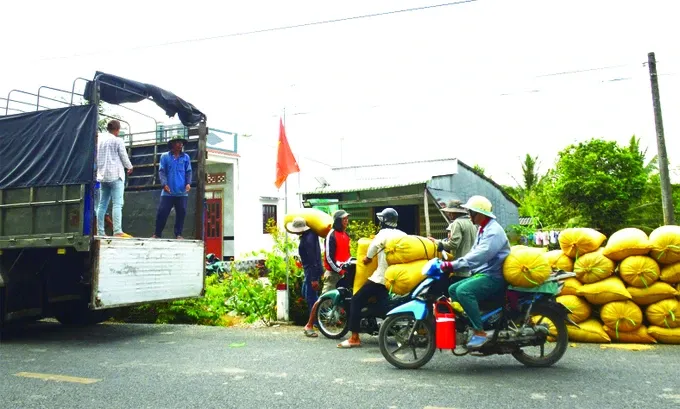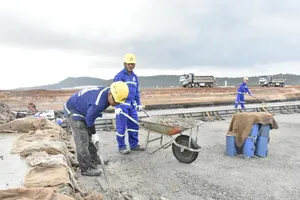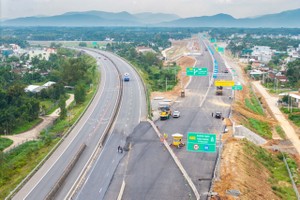
Although not at the peak of the dry season in the South, the weather at the beginning of March 2024 has been so harsh that drought is happening in several localities, causing substantial damages to local inhabitants.
In Ca Mau Province, the water levels in many canals have dropped so low that it is impossible to transport produce like rice via these waterways. Meanwhile, many roads are facing land subsidence or landslide, and thus unable to accommodate heavy vehicles. This leads to double shipping expenses for rice to VND250,000 – 500,000 (US$10-20) per tonne compared to the regular method of using waterways.
The People’s Committee of Tran Van Thoi District of Ca Mau Province reported that landslides and subsidence are happening on a daily basis in the areas fighting against saltwater intrusion. Since the beginning of this dry season, about 430 locations on 117 routes have witnessed these incidents, creating a damage of VND15 billion ($607,600) already.
Until this March, 34 spots with a length of more than 900m have been successfully addressed. The local authorities have sent warnings to residents to evacuate out of dangerous areas of landslides or subsidence. 250 warning signs have been installed, along with barriers, to limit traffic volumes there.
In Bien Bach Commune of Thoi Binh District, another story takes place. Local people are facing such a serious water shortage that the water supply stations there could only provide the service to upstream neighborhoods but not to the downstream ones, where dwellers have to wait for a long time to receive usable water from small boats.
Because the salinity intrusion this year comes too early and severely, yesterday, Cai Lon Sewer in Kien Giang Province had 7 out of its 11 gates closed. Those of Cai Be Sewer nearby will also be closed when the tide is high and reopened during low tide.
In Tien Giang Province, after Nguyen Tan Thanh Sewer had been closed on March 1 to prevent salinity from intruding farmland, the weather conditions here were closely monitored. If there are signs of water shortage for daily operations and production, especially for irrigation on the Winter-Spring rice crop land, the province will immediately request the agricultural sector to organize pumping activities.
The 6 sewers along Provincial Highway No.864 completed their upgrades in time to protect nearly 20,000ha of orchards along Tien River. Besides, in the islandic areas of Ngu Hiep and Tan Phong, the province has set up 20 deep-drilled wells to retrieve water for fruit trees there, particularly durian trees.
Similarly, Hau Giang Province is urgently directing functional agencies to close its sewer gates in Long My District to stop saltwater intrusion. Luckily, farmers in the district strictly followed instructions to sow rice seeds on time for harvesting, so they are not too afraid of negative effects of this intrusion right now.

According to Assoc. Prof. Dr Le Anh Tuan – former Vice Chairman of Research Institute for Climate Change (Can Tho University), local people from the provinces frequently receiving harmful influences of drought and salinity intrusion like Tra Vinh, Ben Tre, Tien Giang, Hau Giang, and Kien Giang have been more active in applying methods to fight against those disasters.
However, since individual reservoirs are rather limited in size, that water is normally saved for daily operations and animal raising. Experts propose that to reduce water evaporation, it is wise to cover the area right on rootstocks with straw to retain moisture and not to sow seeds for the new crop now to avoid unnecessary damages.
While inspecting the status of landslides and subsidence in the provincial traffic system, Vice Chairman Le Van Su of the People’s Committee of Ca Mau Province reported that water use and management in Tran Van Thoi District is not truly effective, resulting in water from rice fields and ponds leaking into canal beds. This is one main reason for landslides.
Therefore, he asked that the local authorities provide better instructions and more carefully monitor water use in the community during the drought. As to hot spots of land subsidence, it is necessary to adopt suitable measures to reduce the load on canal banks and sea dikes (pruning tree branches, moving heavy objects away, regulating traffic flows).
























